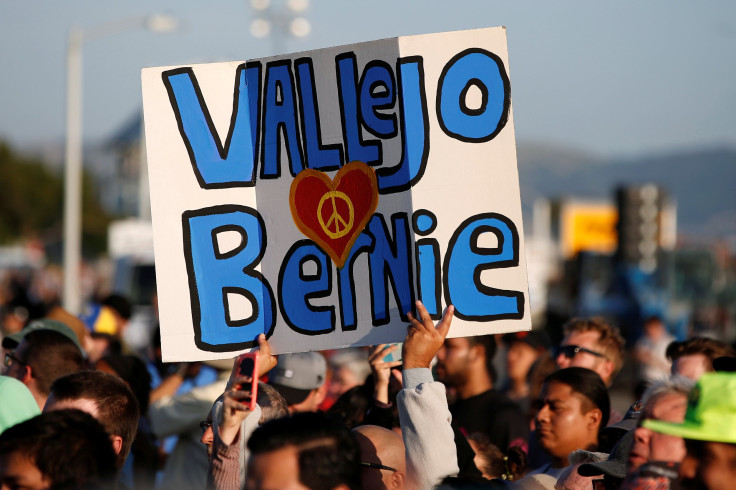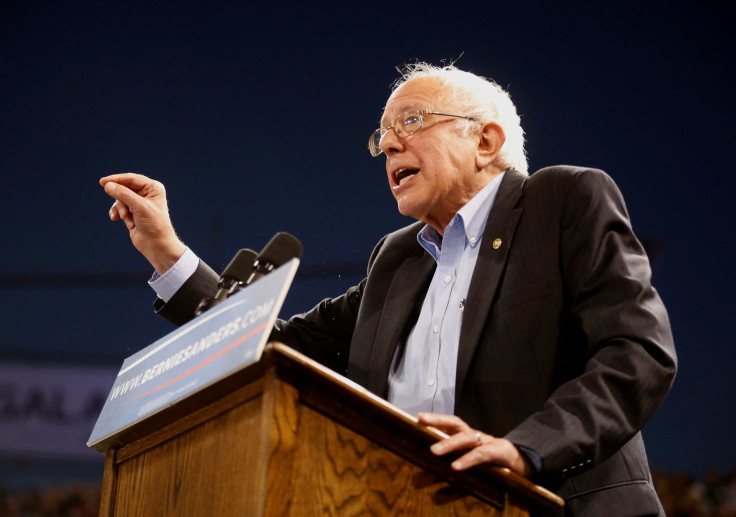Can Bernie Sanders Win California? Delegate Count For Democrats Shows Vermont Senator Still Has Steep Climb

After Bernie Sanders took home another win in Oregon’s primary Tuesday night, the Democratic presidential candidates have a 2 1/2-week break until the final round of primaries and caucuses in early June. Hillary Clinton still holds a nearly insurmountable lead over Sanders, but California’s primary June 7 could offer the Vermont senator a last ray of hope.
With 546 delegates up for grabs in the Golden State, plus another 212 delegates across Montana, New Jersey and New Mexico, which also vote June 7, Sanders has been reminding supporters and pundits that primary season is not over just yet. There are also small amounts of delegates available in the Virgin Islands, Puerto Rico and North Dakota caucuses, as well as the South Dakota and Washington, D.C., primaries.
Sanders said Tuesday night he would win California’s primary and told supporters there that he would not be pressured to drop out.
“This is, in a sense, the beginning of the final push to win California,” he told a stadium of about 10,000 people in the city of Carson. “There are a lot of people out there, many pundits and politicians, they say Bernie Sanders should drop out, the people of California should not have the right to determine who the next president will be. Well, let me be as clear as I can be … We are in till the last ballot is cast!”
But Sanders’ win in Oregon on Tuesday netted him just four more delegates than Clinton, and their near-tie in Kentucky did not help him either. Clinton declared herself the winner in Kentucky on Tuesday night, but the race was extremely close, and the Associated Press had not made a call by early Wednesday morning.
Overall, Sanders picked up 55 delegates to Clinton’s 51 on Tuesday, with 10 delegates remaining pending the final vote tallies. These latest contests put Clinton at 1,767 pledged delegates and Sanders at 1,488. In order for Sanders to overcome Clinton’s lead, he would need to win 68 percent of the remaining delegates, a stronger showing than he has put out so far, according to an Associated Press analysis.
When superdelegates, or party officials who are free to support the candidate of their choice, are included in the count, Clinton has 2,291 to Sanders’ 1,528. This means she would need just 92 delegates to reach 2,383, the number required to clinch the Democratic nomination.

Sanders has said that regardless of the tally, he will try to convince superdelegates to switch from backing Clinton to supporting his bid. His campaign has continued to make the argument that he is the stronger general election candidate against presumptive Republican nominee Donald Trump, and Sanders seems to be hoping his wins can chip away at Democrats’ confidence in Clinton.
There haven’t been a lot of recent polls in California, but the ones that were conducted last month showed Sanders losing to Clinton by a substantial margin, and in one, she held a double-digit lead over him. Sanders holds an average of 41.3 percent support to Clinton’s 51 percent in the state, according to RealClearPolitics.
FiveThirtyEight has Clinton with a 94 percent chance of winning the state, but there are parts of California, with many young people, that could benefit Sanders. Still, winning the state would require an enormous organizing effort, and the Vermont senator’s top aide in California recently left the campaign. The state is also very diverse, and Clinton has continued to do better among Latino and black voters.
Both candidates are likely to spend significant time in California over the next two weeks, and Sanders will need to secure as many delegates as he can get. Whether he focuses on bolstering his case for winning away superdelegates from Clinton or simply influencing the Democratic platform, Sanders aims to leave Clinton with the smallest lead possible going into the Democratic National Convention this summer.
© Copyright IBTimes 2025. All rights reserved.






















